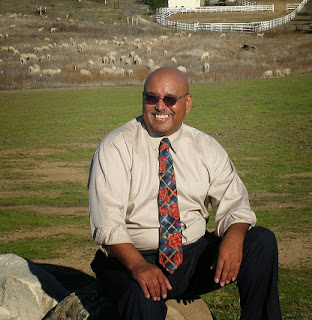Faculty Spotlight: Dr. Pettis Perry (Part 1)
This faculty spotlight features Dr. Pettis Perry, Ed.D., core faculty and program coordinator of the Master of Science in Leadership Program. When we asked Dr. Perry to answer our faculty spotlight questions, he responded with a treasure trove of insights—so much so that we decided to break his response into two parts. Enjoy Part 1!What are the most common writing challenges for your students?
Becoming familiar
with the rules of the game.
Writing is both a science and
an art; it has to be approached both technically and creatively. The science
encompasses all of the rules of the game
associated with writing according to the writing style being used (APA, in the
case of Walden) and expectations established by the academic program. For
example, the MSL program is an applied theory program, so in addition to
language usage and formatting, the rubrics
contain assessments for how well the theory was applied, content accuracy, how
well the narrative was organized, critical thinking, and creativity. The art of writing encompasses the ability
to convey ideas fully, clearly, concisely, and interestingly. Students sometimes
have difficulty here because it is so dependent upon strength of language
skills and the creative centers in the brain.
Learning the language and subject matter of the discipline.
Learning the language of the discipline (subject matter) that
is being studied is fundamental to communicating effectively and authoritatively.
The way to learn the language of the discipline is much like learning anything
new: A writer must use the words and phrases that structure the language of the
subject. With practice, the degree of familiarity with the language and subject
matter will come through in how we communicate our ideas.
Owning your current
skills with a thirst to grow developmentally.
 The willingness to own
our current writing skills is central to learning how to write well. If writers
assume that they write well and have nothing more to learn, they will meet feedback
with denial, frustration, and defensiveness. As frustrating as it might be to
receive substantive content and writing feedback, finding ways to set the ego
aside is crucial to embracing valuable advice. Openly embracing the feedback
may also lead to closer relationships with faculty members who are willing to
work with students when they need additional support.
The willingness to own
our current writing skills is central to learning how to write well. If writers
assume that they write well and have nothing more to learn, they will meet feedback
with denial, frustration, and defensiveness. As frustrating as it might be to
receive substantive content and writing feedback, finding ways to set the ego
aside is crucial to embracing valuable advice. Openly embracing the feedback
may also lead to closer relationships with faculty members who are willing to
work with students when they need additional support.
Creating the time and
space to write.
Finding the time for organizing thoughts and conceptualizing
the narrative before writing can become an overwhelming exercise, particularly
for working parents with young children. Yet, writing well takes time to
construct, proofread, and draft multiple iterations before producing a final
product of which to be proud. Creating the time and space to write may entail
keeping a list of content notes and ideas, writing individual segments of an
assignment as time permits, and then compiling the work into the final document
in a final sitting. Being flexible and creative about how to complete
assignments creates opportunities for completing the work with less
self-imposed pressure.
Learning to
demonstrate critical thinking.
The
MSL program and many other programs at Walden University emphasize the need to demonstrate
strong critical thinking skills as part of becoming a scholar-practitioner.
Critical thinking is defined here as demonstrating the ability to read,
comprehend, synthesize, and use theory-based literature by applying
it to real-world or case study examples.
Demonstrating critical thinking competency requires several skills, such
as (a) identifying a problem by analyzing an operational work environment, personal
experience, or case study; (b) identifying and discussing the applicable
theory that might help explain what was observed; (c) selecting a
real-life experience or case study example that is reflective of the theory; and (d) applying the theory to the real-world example to demonstrate how the
theory are applicable.
What
have you done to help your students master those skills?
With student feedback, I created a course guide titled My Course Survival Guide, which I post
in doc sharing for students to download. The guide covers a range of topics,
including my expectations, helpful writing tips, and some of the more important
APA rules with examples.
The feedback that I provide is intended to assist students
with communicating their ideas more clearly, concisely, and powerfully to
maximize the impact of their communications. The idea is to help them create
what I refer to as bulletproof arguments
that will withstand counterarguments and also to prepare them for their
capstone documents. My bias is for how
things are communicated rather than towards the direction of the narrative
itself. Therefore, I provide substantive feedback regarding the application of
theory and critical thinking and then references to improving technical writing.
When I come across students with language or
critical-thinking deficiencies, I encourage them to contact and work with the
Writing Center, which is a wonderful resource available to all students. As
part of my feedback to students I also download and attach their Grammarly reports
rather than trying to rewrite their papers for them as I used to do. I found
that my attempts to provide detailed writing feedback were overwhelming
students, so I changed tactics. Today, I combine into a single PDF document the
graded paper, rubric, and Grammarly report so that the student has everything in
one place.
I
also make myself available by telephone. One of the positive outcomes of this practice is that
the conversations not only answer questions and lead to increased learning, but
they often lead to positive relationships with students that continue beyond
graduation. My expectations are posted in several places in my classrooms.
Whenever I get the chance, I strongly encourage students to cultivate a work ethic
that includes doing whatever it takes to devour the subject resources and to
submit only quality work.
Dr. Perry currently resides in Bellingham, Washington. Look for his insights in Part 2 of this faculty spotlight soon!
Other posts in our spotlight series:
Faculty Spotlight: Dr. K. Elizabeth McDonald
Student Spotlight: Mary Eldredge-Sandbo
Subscribe to:
Post Comments
(
Atom
)




No comments :
Post a Comment